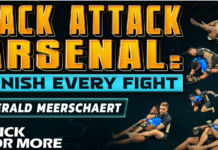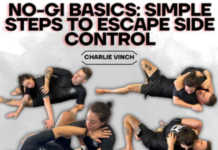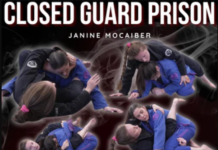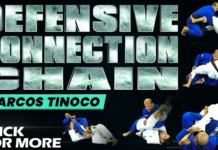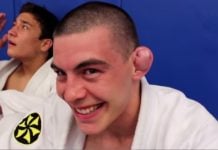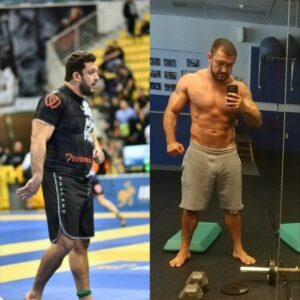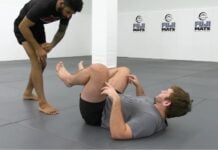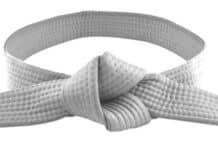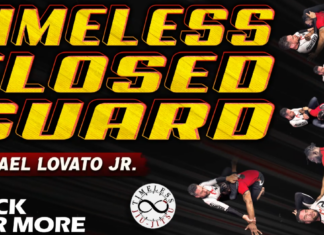
The main thing people that train to compete for aim to get from their nutrition is energy and weight reduction. Since BJJ is a weight-classes sport, it is normal that weight cutting is a big part of it. As such, during competition season, grapplers like to stay within reach of their goal weight. Furthermore, they like to have the energy to train and eat in a way that doesn’t have them standing over the stove for hours.
What if I told you that all of this was possible? Not only that, but you can top it all off by eating really healthy as well. It is not a diet that can help you achieve this, but a protocol. Let’s look into intermittent fasting For BJJ and all the benefits it offers.
Out of the hundreds of diets, both regular ones and athlete-specific, I’ve probably tried about 70 % of them. From keto to calorie counting, Paleo to the Gracie Diet, I’ve done them all at one point or another. They all seemed to work, albeit some better than others.
Depending on my goals, I stuck with some diets for longer, while some didn’t make it past a couple of months. the one thing that did, though, and I still do to this day is intermittent fasting. While it may sound strange, or even scary when you first hear the concept, this nutrition model works like a charm.
As a medical professional, I did my due diligence and researched as much as I can. Now, three years in I feel great and can’t recommend intermittent fasting for BJJ athletes enough!
Intermittent Fasting 101
Do you know what intermittent fasting actually means? Let me make it as simple as possible in one sentence. It means going without food for a certain period of your day. And, depending on the protocol, the length of that part of your day can vary. Now, before you ask yourself why would anyone like to eat (or not eat) in such a manner let’s look a bit deeper at it.
The usual intermittent fasting for BJJ protocol is one of time-restricted eating that goes something like this. You get up in the morning and forego your breakfast for just water and tea/coffee without any additions whatsoever. You extend this practice depending on the length of period you’d like to fast for. At a certain predetermined point of time, you start with your first meal.
Then, again depending on the protocol, you have your meals in another predetermined window. The basic principle of intermittent fasting is that the eating window must be smaller than the fasting one. That’s about it as far as the basics go.
Now, no matter how much you restrict your eating, know that nothing is going to work if you do not eat healthily. The fact that you do not have to control your portion size doesn’t mean you should eat in one meal the amount of food that a small village would eat in a day. Instead, stick to eating as simple as possible – fruit, vegetables, lean meat, nuts, seeds, and grains.
That’s about everything you need to be healthy, and have the energy to last you for days. Eating like this means you won’t have to measure anything, but instead, eat as much as you can during your eating window.
Intermittent Fasting Protocols
So, which is the best protocol for those looking into intermittent fasting for BJJ? There are plenty of versions out there, but only four stand out as useful for grapplers. If truth be told, there are favorites even among them, depending on training schedule and lifestyle. Let’s explore the main versions of intermittent fasting for BJJ athletes:

The Leangains Method
This is the most popular intermittent fasting protocol in the world. It is also the first thing people that have heard of the method think of when you mention time-restricted eating. The Leangains method is one developed by bodybuilder Martin Berkhan in order to help his physique goals.
The method revolves around an 8-hour eating window and a 16-hour fasting one. This is fairly simple for most people and has all the benefits of fasting without keeping you without food for too long.
For the Leangains method, most people tend to eat their last meal of the day at 8 pm. Afterward, it is only water and tea or coffee (optional) until 12 pm. For most people, this works great, since they sleep most of the time anyway.
However, this timeline is not set in stone and you can adjust it as much as you want as long as you keep the feeding/fasting windows the same. Since I train until fairly late at night I usually eat dinner at 11 pm, which puts my next meal at 3 pm the next day. For me, it is the perfect combination.
Remember that getting used to such a rhythm takes time, so start off easy. Try to fast for 10-12 hours the first few days, and gradually increase from there. Even if you can only take 14 hours, it is still going to provide you with most of the benefits.
The Warrior Diet
The warrior diet is a bit harder than the Leangains method, for the reason that you go without food for longer. Here, you only get 4 hours in which you’re supposed to eat all your meals. This one can be tough psychologically, so my recommendation is to try the Leangains method first, before “graduating” to this one. That said, I personally found it too hard for someone on a busy schedule that trains every day.
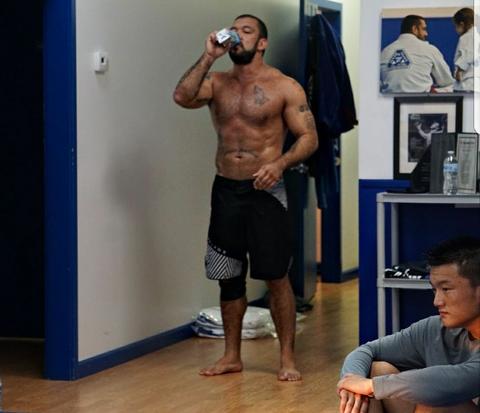
Eat-Stop-Eat
The eat-stop-eat approach has you fasting for a full 24 hours. It is very important that you understand that you can’t and shouldn’t do this more than twice a week, although one is more than enough. Similar to the Warrior diet, you can use it on your rest day since it is not smart to train in a depleted state.
The usual approach is fasting from breakfast to breakfast, but you might choose any time that’s convenient for you. As far as intermittent fasting for BJJ goes, this one is the hardest, and least useful of all the methods.
Alternate Day Fasting
Alternate day fasting is for those that do not want to/can’t adhere to a daily protocol. The method has you fasting every second day. Let’s clear it up.
You start Monday with a 12-hour eating window. Once it ends, let’s say at 8 pm, you go on to fast for a full 36 hours and not eat again until 8 am on Wednesday. Then you repeat the cycle. This will have you without food more than any of the other intermittent fasting protocols. However, it ends with a period of time in which you can eat for quite a long time.
The trouble with this method is that it might have your training twice during a fasting window. Unless you have massive amounts of weight to lose, I do not recommend this, even sporadically.
Intermittent fasting for BJJ needs to help grapplers perform better, not worse. And as demanding as BJJ is, going hungry for 36 hours is hardly a good idea under any circumstances. if you’re on a hiatus though, due to injury or something else, you might want to toy with this method so that you keep your weight in check.
Health Benefits Of Intermittent Fasting
- Weight Loss without restricting the daily entrance of calories in your body.
- Inflammation reduction
- Reduces insulin resistance
- Lowers Cancer Chance
- Improves heart health
- Improves brain health
- Anti-aging benefits. Intermittent fasting rats were living 30-80% more.
- Boosts metabolism
Intermittent fasting has been researched quite thoroughly, in both animals and humans. There are numerous studies out there providing precise data on the benefits of time-restricted eating. Even our ancestors found it useful as still witnessed by religious fasts in almost every religion available.
Among the main physiological benefits of fasting is gut health. Going without food for more than 12 hours allows your gut to empty completely and recover without having to work constantly. This also holds true for every other cell in your body. If the body isn’t busy digesting food, it can focus on repairing much more efficiently.
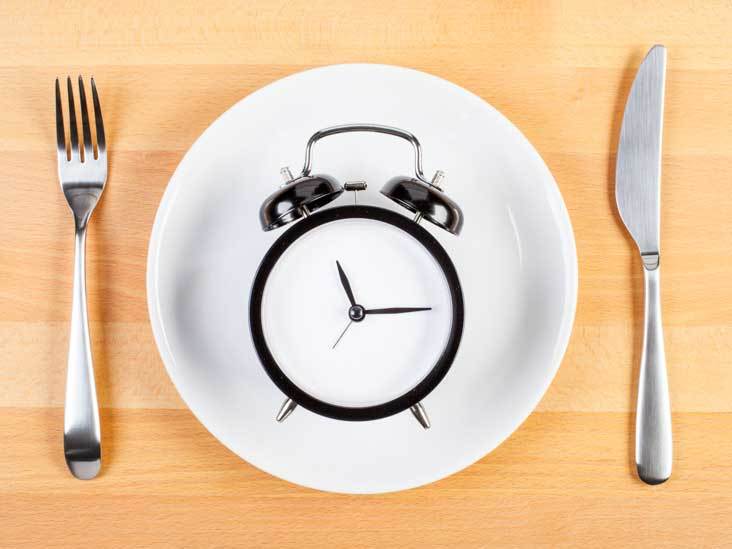
There are also indications that fasting reduces the risk of cancer. It also lowers the oxidative stress of the body, reducing cellular damage.
A major benefit of intermittent fasting for BJJ athletes is fat burning. It is beyond a doubt that your fat utilization is going to rise significantly when you start using the protocol. Your metabolic rate is also going to speed up and improve. Fasting also impacts hormones, from growth hormone, through testosterone to insulin.
Fasting also provides blood sugar stability as well as appetite control. Once you figure out that hunger is mostly psychological it’ll be easy to only eat in a short window during the day.
The Cons of intermittent fasting
- In some cases, you can gain weight if you eat more calories than your body is able to burn, so what you eat is a crucial part of your diet
- You may feel tired and moody because not eating for prolonged periods of time can negatively affect your psychological state and your cognitive functions
- Not eating for a long period of time can cause Headaches, Dizziness, and Nausea.
- Restrictive eating can lead to eating disorders
Intermittent Fasting For BJJ
Finally, let’s look at some of the ways in which intermittent fasting can help your Jiu-Jitsu. One major benefit is reducing inflammation. BJJ usually puts our bodies under a lot of stress. Not only that, but training sessions, especially pure rolling ones, tend to last quite long. That means inflammation is always high after training.
If you’re doing intermittent fasting for BJJ, your body will have a lot more strength to deal with inflammation due to the fact it is not digesting food all the time. This means your recovery time is going to be much better than before.
The hormonal boost and blood sugar stabilization are two aspects that also pertain to grappling a lot. Growth hormone is key to repairing muscle tissue that gets broken down during training. Stable blood sugar, on the other hand, means your body can manage energy consumption a lot more efficiently. This means your energy during training, and throughout the day is going to improve a lot.
Finally, intermittent fasting for BJJ provides a great way of maintaining weight throughout the season, or on a constant basis. You could even use a combination of the methods to further cut weight before a competition, without having to suffer. Your body is going to become much better at using food and converting it to energy, meaning small adjustments are going to go a long way to help you cut weight fast!
Things to keep in mind when intermittent fasting
- Choose a simple diet at the start so you could stick to it as changing the habits drastically could affect your will to continue
- Drink a lot of water and other non-caloric drinks like coffee or tea. While adding a bit of milk to coffee is ok adding sugar isn’t.
- Don’t skip breakfast.
- Try to balance your fasting time when you’re not very active if you can.
- Exercise as before. It’s ok to workout while fasting. Some people recommend using BCAA (branched-chain amino acids) before a workout.
- Avoid eating or snacking at night time. It will negatively impact your HGH and your insulin level.
- Listen to your body no matter what. Nothing is more important than your health. If anything weird is going on for few days consider stopping intermittent fasting and visit a doctor.
Considerations
In terms of things, you need to know when deciding to try intermittent fasting for BJJ, there are a few. The two major mistakes people make are in regard to food choices. First and foremost, when people finish fasting they tend to go all-out during their eating window.
Combining binging with choosing poor food choices is going to render the fact that you’re fasting next to useless. Eat as much as you want, but apply common sense, and make sure you’re only eating unprocessed, real food.
Next, you might find yourself undereating during time-restricted diets. The thing is that you need to ingest a certain amount of calories each day, in order to function optimally. With fasting, you have a limited window in which to get all the calories in. Choosing high-caloric foods, like meat, and good fats is a great way of making sure you’re hitting your macros.
The one thing that is a major drawback of all intermittent fasting protocols is the fact they may not be applicable to females. Some studies and practical experiences point out hormonal disruptions when women take up one of the protocols, even the Leangains one. Since female hormones are also on a monthly cycle in addition to a daily one, a few tweaks are needed. One is reducing the fasting window and increasing the eating one. A 12:12 hours window or 13:11 is a good place to start.
Final Words
Keep in mind that intermittent fasting can be great for some people, but it’s definitely not for everyone. So, you have to try it before you decide which group of people you’re in,
Finally, make sure you consult your physician before you decide to give intermittent fasting for BJJ a try.
A Jiu-Jitsu Workout Program To Lose Fat And Improve Performance

